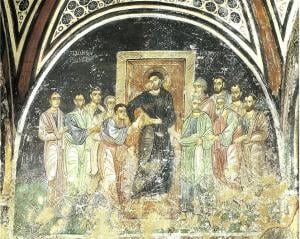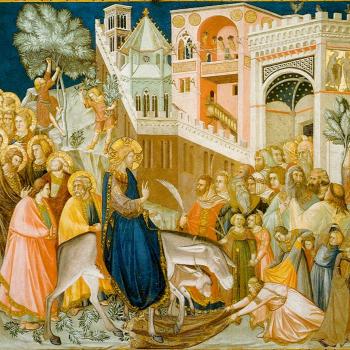
The first Sunday after Pascha reminds us that Christ’s resurrection from the dead is not merely some historical fact, a mere historical event — it is an eternal event integrates itself with history and allows us to be drawn into it and experience it ourselves. Christ is risen, and we can meet the risen Christ in a variety of ways. He has a glorified body, one which demonstrates to us what our bodies can and will be like in the eschaton. Christ is the lord of life and death; he is the one who willingly gave himself up to death, in and through apparent weakness, so as to prove the eternal superiority of life over death. Christ died, and death took him with the rest of the dead only to find that it could not keep him: he broke through death and came back, not just to life, but to a transformed life where death no longer had any power over him. He shows through his resurrection that death has an end: by death he conquered death, and now all of us can be drawn with him into the resurrection, into a new form of existence in the eschaton, an existence which is no longer bound by temporality as it takes place in eternity.
Christ rose from the dead, and though we can describe how his resurrection was experienced in a particular time and place, that is, at his tomb, and from there, the way the resurrected Christ was experienced first by his mother, then the myrrh-bearing women, then by Peter and the other Apostles (except Thomas), then Thomas, and then by countless others. The full force of the event lies beyond time and space, even if a part of it can be said to have taken place or incorporated by both, which is why people can come to it and experience the same event, coming to it at different times and places, such as the way the apostle Thomas finally encountered the resurrected Christ after the rest of the apostles:
Now Thomas, one of the twelve, called the Twin, was not with them when Jesus came. So the other disciples told him, “We have seen the Lord.” But he said to them, “Unless I see in his hands the print of the nails, and place my finger in the mark of the nails, and place my hand in his side, I will not believe.” Eight days later, his disciples were again in the house, and Thomas was with them. The doors were shut, but Jesus came and stood among them, and said, “Peace be with you.” Then he said to Thomas, “Put your finger here, and see my hands; and put out your hand, and place it in my side; do not be faithless, but believing.” Thomas answered him, “My Lord and my God!” Jesus said to him, “Have you believed because you have seen me? Blessed are those who have not seen and yet believe” (Jn. 20:24-29 RSV).
The resurrection event is an ongoing, eternal event, one which draws us into it to experience it for ourselves. This is why, many years later, Paul was able to meet the resurrected Christ and to be called by him to become an apostle. It is the same Christ who died that is resurrected; it is the same Christ who established the first apostles and who later called Paul, even if when he called Paul, he was in his glorified form; it is the same Christ who can be depicted in images that we can now experience in communion. Christ continues to show himself, revealing many truths to those who encounter him in his resurrected glory, and through, and for them, he continues to do many great and glorious things:
Now Jesus did many other signs in the presence of the disciples, which are not written in this book; but these are written that you may believe that Jesus is the Christ, the Son of God, and that believing you may have life in his name (Jn. 20:30-31 RSV).
Christ shares with those who encounter him with all kinds of grace, all kinds of gifts. If we try to explore all that he does in his resurrected glory, we will find it is impossible. Sometimes, he does things we know because he directly interacts with us and does something great; sometimes, however, he does something so subtle, we can barely discern his involvement. He is also at work in and through those who have joined themselves to him, so that through them, they continue his work in the world, a work which includes helping those in need, such as those who are sick in either their body or their soul. This is why Luke wrote to help us see the way the early Christians continued his mission, and in doing to, to prove it, there were many signs and wonders which followed after them:
Now many signs and wonders were done among the people by the hands of the apostles. And they were all together in Solomon’s Portico. None of the rest dared join them, but the people held them in high honor. And more than ever believers were added to the Lord, multitudes both of men and women, so that they even carried out the sick into the streets, and laid them on beds and pallets, that as Peter came by at least his shadow might fall on some of them. The people also gathered from the towns around Jerusalem, bringing the sick and those afflicted with unclean spirits, and they were all healed. (Acts 5:12-16 RSV).
We are called to experience the glory of the resurrection for ourselves, to become like Thomas, finding ourselves experiencing it after many others. We are called to share in Christ’s continuous ministry to the world, reaching out to help transform the world, to make it better, knowing that there will be no utopia in the world but in and through grace, it can be made better. We are to heal the world from the ravages done to it by sin, even as we are to help direct everyone to the resurrection, to the transcendent glory which has been reveled in it, so that they can experience what we have experienced for themselves, and share, then, in the grace and truth which transcends all comprehension.
Stay in touch! Like A Little Bit of Nothing on Facebook.
If you liked what you read, please consider sharing it with your friends and family!
N.B.: While I read comments to moderate them, I rarely respond to them. If I don’t respond to your comment directly, don’t assume I am unthankful for it. I appreciate it. But I want readers to feel free to ask questions, and hopefully, dialogue with each other. I have shared what I wanted to say, though some responses will get a brief reply by me, or, if I find it interesting and something I can engage fully, as the foundation for another post. I have had many posts inspired or improved upon thanks to my readers.
















